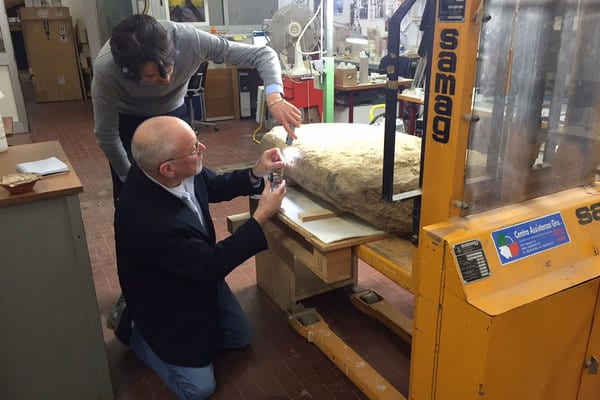Archaeologists unearthed a big Etruscan artifact in Italy – a big deal considering how little is known about the ancient civilization’s language and religion.
Science reporter Story Hinckley with The Christian Science Monitor covered SMU sponsored research at Italy’s Poggio Colla site where archaeologists have found what may be rare sacred text in the lost language of the Etruscans. The text is inscribed on a large 6th century BC sandstone slab and could reveal name of the god or goddess that was worshipped at the site.
The article, “2,500-year-old slab offers window into ancient Etruscan faith,” published March 30.
EXCERPT:
By Story Hinckley
The Christian Science Monitor
A large sandstone slab dating back to the 6th century BC could hold clues about the religious beliefs of ancient Etruscans, if only archaeologists could read it.Uncovered from an Etruscan temple in Tuscany after being buried for over 2,500 years, researchers believe the stone holds an important religious text. The 500-pound stele (the term that archaeologists use for such slabs) measures four feet tall by two feet wide and holds roughly 70 letters and punctuation marks.
Because of the rarity of Etruscan artifacts, not much is known about the Etruscan language. The little knowledge on the ancient language is limited to specific language written on funerary objects, which make up the majority of Etruscan discoveries. In translating the large stele, archaeologists will establish a broader understanding of Etruscan letters and words.
“We hope to make inroads into the Etruscan language,” archaeologist Gregory Warden, co-director and principle investigator of the Mugello Valley Archaeological Project and professor at Franklin University Switzerland, said in a press release. “Long inscriptions are rare, especially one this long, so there will be new words that we have never seen before, since it is not a funerary text.”
Archaeologists also say the artifact’s language could tell them more about Etruscan religion, and in turn more about the Romans, who were influenced by the Etruscan way of life.
“This is probably going to be a sacred text, and will be remarkable for telling us about the early belief system of a lost culture that is fundamental to western traditions,” added Dr. Warden.
Follow SMUResearch.com on twitter at @smuresearch.
SMU is a nationally ranked private university in Dallas founded 100 years ago. Today, SMU enrolls nearly 11,000 students who benefit from the academic opportunities and international reach of seven degree-granting schools. For more information see www.smu.edu.
SMU has an uplink facility located on campus for live TV, radio, or online interviews. To speak with an SMU expert or book an SMU guest in the studio, call SMU News & Communications at 214-768-7650.



 NASA data leads to rare discovery: Earth’s moon wandered off axis billions of years ago
NASA data leads to rare discovery: Earth’s moon wandered off axis billions of years ago Good news! You’re likely burning more calories than you thought
Good news! You’re likely burning more calories than you thought New look at Pizarro’s conquest of Inca reveals foot soldiers were awed by empire’s grandeur
New look at Pizarro’s conquest of Inca reveals foot soldiers were awed by empire’s grandeur